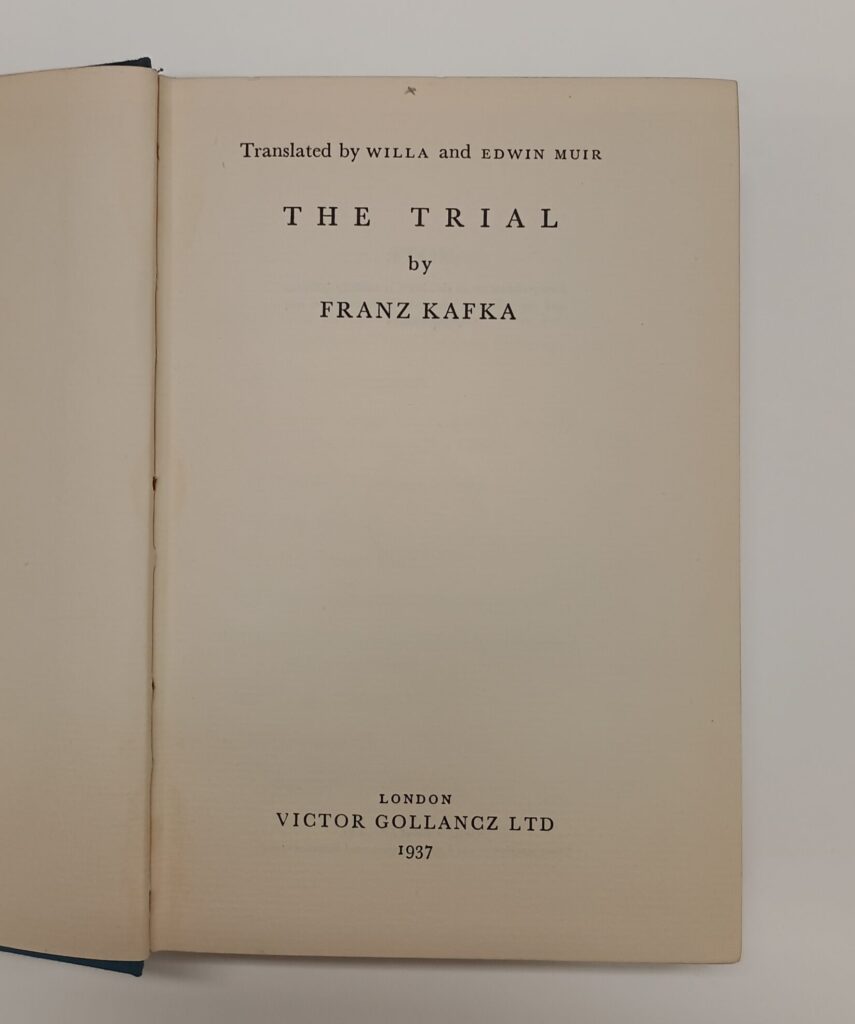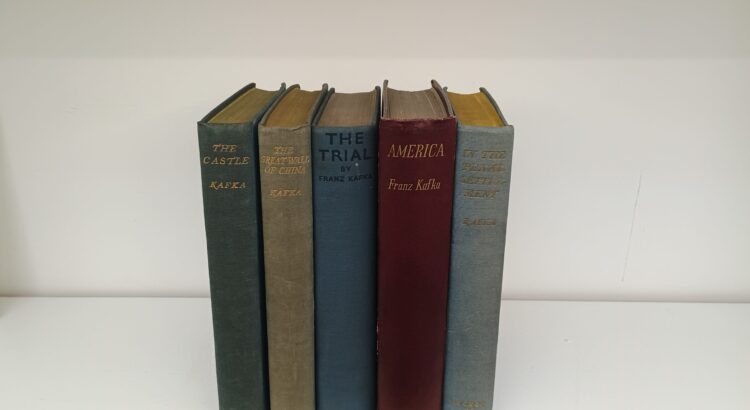Pictured above are the first editions of the translations of the works of Franz Kafka by Willa and Edwin Muir in order of publication, left to right. Between 1930 and 1949 Willa and Edwin Muir would bring the fiction of Franz Kafka to English readers for the first time and their translations would become the canonical English language editions for decades and remain in print today. “All serious students of fiction are much indebted to Mr and Mrs Edwin Muir for their translations of the works of Franz Kafka” said the reviewer of the couple’s translation of “The Great Wall of China” by Franz Kafka in “The Scotsman” on 18th May 1933. The translations received much acclaim when they were published in Great Britain and caused a sensation when they were published in America in the 1940s where they would find their way into the hands of Orson Welles and a young Philip Roth and Woody Allen.
On 3rd June 2024 it is exactly 100 years since the death of Franz Kafka and just over 94 years since the publication of the first of the Muir’s Kafka translations, “The Castle”. In a preface to “The Castle” Edwin Muir writes “Franz Kafka’s name so far as I can discover, is almost unknown to English readers. As he is considered by several of the best German critics to have been perhaps the most interesting writer of his generation, and he is in some ways a strange and disconcerting genius, it has been suggested that a short introductory note should be provided for this book, the first of his to be translated into English”. One hundred years after his death the works of Kafka, who was part of the small German speaking Jewish community in Prague during the last days of the Hapsburg Empire, continue to connect with readers all around the world in many languages. Scottish married couple Willa and Edwin Muir played a key part in making Kafka an international icon.
Willa Anderson (1890-1970) and Edwin Muir (1887-1959) were born and brought up on Scottish islands, Willa on Shetland and Edwin on Orkney. Willa was a star student and that rarity for the time a female graduate of St Andrews University where she studied classics. Edwin’s family moved to Glasgow when he was 14. Within four years of the move both his parents and two of his siblings had died and the young Edwin worked in a succession of menial jobs to support himself and his family. The two met in London in 1918 where Willa was working as the vice-principal of a college and Edwin was hoping to pursue a career as a literary journalist and married in 1919. They wanted to travel and the success of Edwin’s first book “We Moderns” (1918) provided the money for the young couple to live in Germany, Czechoslovakia, Italy, Austria and France. The money had run out by the time they were living in Germany in 1926 so they were delighted to receive a letter offering them translation work. They had just enough funds to send a two word telegram in reply “Yes, Muir”.
The Muir’s translation of Lion Feuchtwanger’s novel “Jew Süss” was a commercial success in 1926, opening up a new source of income for the cash strapped couple. Edwin had published a collection of verse “First Poems” (1925) and was establishing a reputation as one of the leading poets of the day. The poetry though took up a lot of his time and paid very poorly so it was imperative that they had other sources of income to supplement what Willa made from teaching and writing. Edwin proposed a translation of “Der Schloss” a novel by an obscure author called Franz Kafka to the publisher Martin Secker. In 1930 “The Castle: a novel” by Franz Kafka, translated from the German by Willa and Edwin Muir appeared. It would be followed by “The Great Wall of China” (1933), “The Trial” (1937), “America” (1938) and “In the Penal Settlement” (1949). In 1953 the Muir’s translation of “The Trial” would be published as an inexpensive Penguin paperback bringing Kafka to the masses and the Muir’s translations of Kafka would be a fixture of the Penguin list for decades.
In her memoir “Belonging” (1968) Willa describes how they did the translations “We divided the book in two, Edwin translated one half and I the other, then we went over each other’s half with a fine tooth comb”. This differs from the account that Willa gives in her private journals. Here Willa writes that she did the bulk of the translations especially of Kafka and records her frustration with Edwin’s failure to correct public and critical misapprehensions about who did what. Pointedly Michelle Wood in “Kafka translated” (2014) entitles her chapter on the Muir’s translations just “Willa Muir” and makes a strong case that Willa did the translations with some help from Edwin.
Today the Muir’s translations of Kafka are no longer regarded as the standard English language editions. Some see them as dated and flawed in their fidelity to the German text. This is as much due to the complex history of Kafka’s works as any failing on the part of Willa and Edwin. Kafka’s three novels were not published or indeed completed in his lifetime. The manuscript of “The Castle” is in six notebooks which includes false starts and repetitions. Max Brod (1884-1968) was Kafka’s friend and famously when he became his literary executor disobeyed Kafka’s wish that his manuscripts be destroyed. Brod thought his friend was a genius and wanted to ensure his books were a success. To achieve this he edited out some of the strangeness and repetitions that were central to Kafka’s style to make his work more acceptable to a general audience. He heavily edited Kafka’s manuscripts especially the one for “The Castle” leaving out many passages. It was these Brod edited texts that were translated by the Muirs. In the 1980s scholars went back to Kafka’s manuscripts and published new more complete critical editions which have been the basis for subsequent English translations.
The Muir’s importance to the reputation and reception of Kafka in the English speaking world is comparable to that of Constance Garnett (1861-1946) as a translator of classic Russian literature. Garnett was the first English translator of Anton Chekhov (1860-1904) and Fyodor Dostoevsky (1821-1881). Her translations have been criticized as being outdated and inaccurate but many remain in print and for generations of readers and writers it was through Garnett translations they encountered Russian literature. Nearly a century after Willa and Edwin Muir started to translate Kafka the impact and influence they had on how we read and perceive the work of Kafka in the English speaking world seems likely to be eternal.
Max Brod fled Czechoslovakia in 1939 with a suitcase of Kafka’s manuscripts just before the German invasion. Today many of Kafka’s manuscripts including the one for “The Castle” are in the collections of the Bodleian Library in Oxford. To mark the centenary of Kafka’s death the Bodleian Library have curated an exhibition “Kafka: the making of an icon” which offers a rare chance to see pages from Kafka’s manuscripts.
Further reading
You can read the rare first editions of Willa and Edwin Muir’s translations of Kafka at the National Library of Scotland
The Castle: a novel. Pressmark T.228.h
The Great Wall of China and other pieces. Pressmark T.180.f
The Trial. Pressmark Vts.258.k.20
America. Pressmark Vts.220.g.41
In the penal settlement: tales and short prose works. Vts.183.d.27
You can also read more about Willa and Edwin Muir and other translators of Kafka in Michele Wood’s. Kafka Translated: How Translators Have Shaped Our Reading of Kafka. Bloomsbury, 2014. Pressmark PB8.214.665/3

